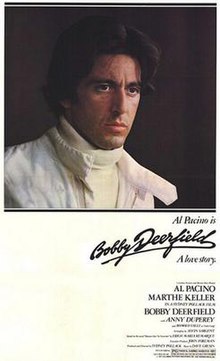Bobby Deerfield
| Bobby Deerfield | |
|---|---|

Theatrical release poster
|
|
| Directed by | Sydney Pollack |
| Produced by | Sydney Pollack |
| Screenplay by | Alvin Sargent |
| Based on |
Heaven Has No Favorites by Erich Maria Remarque |
| Starring | |
| Music by | Dave Grusin |
| Cinematography | Henri Decaë |
| Edited by | Fredric Steinkamp |
|
Production
company |
|
| Distributed by |
|
|
Release date
|
|
|
Running time
|
124 minutes |
| Country | United States |
| Language | English |
| Box office | $9,300,000 (USA) |
Bobby Deerfield is a 1977 American romantic drama film directed by Sydney Pollack and starring Al Pacino and Marthe Keller. Loosely based on the 1961 novel Heaven Has No Favorites by Erich Maria Remarque, the film is about a famous American race car driver on the European circuit who falls in love with an enigmatic Swiss woman who is terminally ill. For his performance in the film, Al Pacino was nominated for a Golden Globe for Best Motion Picture Actor. Parts of the movie scenes were filmed in Varenna and Lierna, Lake Como.
Formula One auto racer Bobby Deerfield is a calculating, control-obsessed loner who has become used to winning the checkered flag on the track. But after he witnesses a fiery crash that kills a teammate and seriously wounds a competitor, Deerfield becomes unsettled by the spectre of death.
During a visit to the survivor, Deerfield's world is further set askew when he meets Lillian Morelli (Marthe Keller), a quirky, impulsive woman racing against time.
Critics panned Bobby Deerfield as an over-the-top melodrama with a plodding story line; audiences reportedly laughed at scenes intended to be dramatic. Race-film fans, expecting another Grand Prix or Le Mans, were disappointed that the story did not play out on the race track; however, the action footage was filmed by racing cinematographers over the course of the 1976 Formula One season and features actual drivers, including Carlos Pace, Tom Pryce, James Hunt, Patrick Depailler and Mario Andretti. Vincent Canby of The New York Times said that it "may turn out to be the year's most cynical movie made by people who know better, including Sydney Pollack, the director, and Alvin Sargent, who wrote the screenplay."
...
Wikipedia
